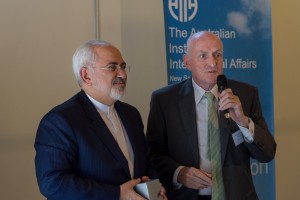Visit by Iranian Foreign Minister
Iranian Foreign Minister Dr Mohammad Javad Zarif came to Glover Cottages on Wednesday 16 March for discussions with selected Australian experts. He said there were conflicting narratives about the recent past in the Middle East. But stubborn insistence on the truth of these by their proponents without acknowledging historical background would not advance efforts towards peace. Certain countries loudly condemned recent Iranian missile tests, but conveniently forgot that Iraq invaded Iran in 1980 and during eight years of hostilities fired thousands of missiles into Iran. Iran’s current generation of missiles were for defensive purposes, and misinformation and selective indignation would not alter the facts.
Zarif said Iran had a vibrant democracy. In the recent elections 80% of incumbents lost their seats in the Majlis, and 20 or more new candidates contested each of them. Proportionately, Christians, Zoroastrians and Jews had more seats than Muslims. An interlocutor asked about the repression of Baha’is. Zarif said Iran was governed by sharia law. Islamic jurisprudence governed marriage, divorce and inheritance. It was tolerant of Jewish and Christian precepts, but not of religions that decided to proselytise outside sharia law.
Driving the Iranian economy, said Zarif, was a young, talented and reasonably priced work force. Annually, Iran produced the fifth largest number of engineering graduates in the world. With sanctions lifted under terms of the nuclear Joint Comprehensive Plan of Action, Iran was wide open for investment – not least in port facilities, new technologies, biotechnology, water resources. Immediately prior to the AIIA meeting, Zarif had had productive talks with Austrade, which thought as he did about trade and investment opportunities. Many commercial opportunities would open up for Australia in Iran. Iran wanted to become part of a global chain of manufacturers.
Zarif condemned terrorism. ISIS was not a state, but a perversion of Islam. Many among its ranks, those who blew themselves up to kill a few bystanders, spoke English and French and were predominantly the product of democracies, not dictatorships. Their thought processes were a mystery, to which Zarif had no answer. Man Haron Monis, an Iranian, had terrorised Sydney in December 2014, but his thought processes were as unfathomable to Zarif as those of other self-immolators. But who fought seriously against ISIS’s pernicious beliefs? Not the United States or NATO with largely ineffective but enormously destructive aerial bombardments, nor Saudi Arabia or the Gulf States with money, but the Kurds, and Iran too, with advisors and equipment on the ground. Iran was asked to gain the confidence of the Gulf States, but it was those states which needed to gain the confidence of Iran. ‘Red lines’ were unilaterally imposed on Iran and Syria, but Iran would not have red lines imposed on it, any more than it could impose red lines on others. Negotiations were the only way forward – more listening, less talk, especially on Syria. Churchill was right: jaw jaw would prove infinitely more productive than war war.
Zarif was asked about Russia – why had Putin suddenly decided to withdraw his aerial forces from Syria? He speculated that Putin saw no immediate need for further bombing raids, but Russia retained a base in Latakia and could return at a moment’s notice. Zarif implied that he had no direct line to Vladimir Putin. He was asked about Africa, and claimed that Iran was one of the most active Middle Eastern countries involved in African economic development. Asked about Israel, he said that Iran had nothing to do with the Israelis. Israel must work out its differences with the Palestinians, but the analysis in Tehran was that Israel was currently incapable of gaining peace with its neighbours.
Report prepared by Richard Broinowski
